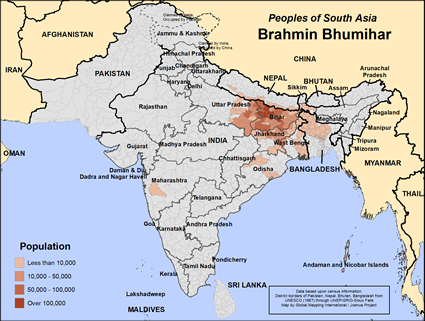Brahmin Bhumihar in India

Photo Source:
Anonymous
|

Map Source:
People Group data: Omid. Map geography: UNESCO / GMI. Map Design: Joshua Project.
|
| People Name: | Brahmin Bhumihar |
| Country: | India |
| 10/40 Window: | Yes |
| Population: | 2,806,000 |
| World Population: | 2,823,000 |
| Primary Language: | Hindi |
| Primary Religion: | Hinduism |
| Christian Adherents: | 0.00 % |
| Evangelicals: | 0.00 % |
| Scripture: | Complete Bible |
| Ministry Resources: | Yes |
| Jesus Film: | Yes |
| Audio Recordings: | Yes |
| People Cluster: | South Asia Hindu - other |
| Affinity Bloc: | South Asian Peoples |
| Progress Level: |
|
Introduction / History
The Brahmin Bhumihars are a landowning caste of northeast India. The name Bhumihar means "landowner." They gained much of their property through military service during the Mughal period. They served as zamidars, aristocrats who collected taxes for the Muslim rulers. Later on during the British period, the Bhumihars sometimes served in the British army and at other times fought against British rule.
For the past 150 years the Bhumihars have been fighting to get their status of Brahmins confirmed by Indian society. Other Brahmins have seen them as an offshoot of the Kshatriya or warrior caste or even the laborer caste. Today they are officially accepted as Brahmins even though they only perform three of the six duties of a Brahmin priest.
The Bhumihar are active in politics and serve as government leaders in the states of northeast India. Their first language is Hindi. They also speak other regional languages.
The ancestors of the Nobel Prize-winning author V. S. Naipaul were Bhumihars. He won the Nobel Prize for literature in 2001.
Where Are they Located?
The Brahmin Bhumihar live primarily in the Indian states of Bihar, Uttar Pradesh, Jharkhand and Madhya Pradesh.
What Are Their Lives Like?
As Brahmins, the Bhumihars live at the highest level of Indian society. Many attain graduate degrees and work as attorneys, university professors, military officers, government leaders, engineers and computer scientists.
The Bhumihar still hold large tracts of land in northeast India. Lower castes farm the land for the landowners. The land is passed on from fathers to sons.
Young Bhumihars are given some freedom as to whom they marry. They are strongly encouraged by their families to marry other Bhumihars or other Brahmins.
Some of the Bhumihars are vegetarians. Others eat meat except for beef and pork.
What Are Their Beliefs?
The Bhumihar are Hindus. It is an essential part of their identity. There is a wide range of belief among them from being devoted believers in the Hindu gods to being secularists. The Bhumihar generally do not serve as temple priests or officiate at religious rituals for the lower castes as many Brahmins do.
The large majority of Bhumihar participate in the Hindu holidays of Holi, the festival of colors, Diwali, the festival of lights and Navratri, the celebration of the Nine Nights.
What Are Their Needs?
The Brahmin Bhumihars must see their sin and need for a Savior.
The Bhumihar need to see the love and light of Christ lived out before their eyes.
Prayer Points
Pray for Christ to reveal Himself to Bhumihars.
Pray for Holy Spirit directed Christ followers to go to Brahmin Bhumihar communities and live out the teachings of Christ among them.
Pray for a disciple making movement to emerge among every Bhumihar community.